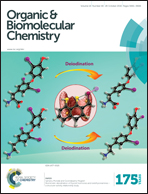Biasing hydrogen bond donating host systems towards chemical warfare agent recognition†
Abstract
A series of neutral ditopic and negatively charged, monotopic host molecules have been evaluated for their ability to bind chloride and dihydrogen phosphate anions, and neutral organophosphorus species dimethyl methylphosphonate (DMMP), pinacolyl methylphosphonate (PMP) and the chemical warfare agent (CWA) pinacolyl methylphosphonofluoridate (GD, soman) in organic solvent via hydrogen bonding. Urea, thiourea and boronic acid groups are shown to bind anions and neutral guests through the formation of hydrogen bonds, with the urea and thiourea groups typically exhibiting higher affinity interactions. The introduction of a negative charge on the host structure is shown to decrease anion affinity, whilst still allowing for high stability host-GD complex formation. Importantly, the affinity of the host for the neutral CWA GD is greater than for anionic guests, thus demonstrating the potential for selectivity reversal based on charge repulsion.



 Please wait while we load your content...
Please wait while we load your content...